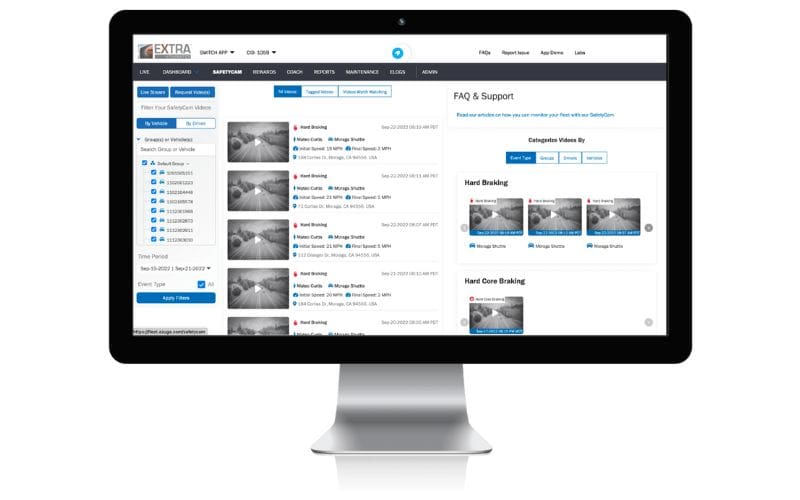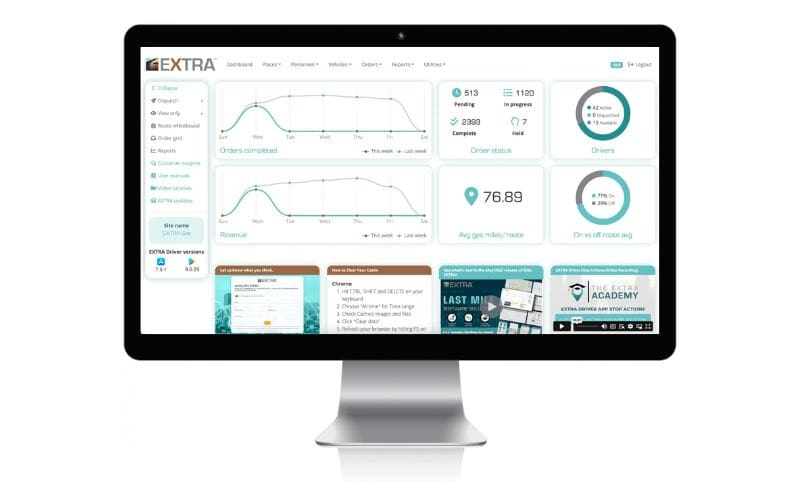
The global fleet management industry is expected to grow at a compound annual growth rate of 10.6% till 2030. While this ensures it remains lucrative, navigating the world of logistics will remain turbulent and susceptible to disruptions like driver shortages and fluctuating gas prices.
However, with the continuous improvements in fleet management technology, there are promising developments that will help address these issues. As a top fleet manager, you understand how impactful anticipating and capitalizing on future market trends can be.
So, keep reading to gain invaluable insights into the fleet management technology trends that will dominate 2024 and beyond.
Trends in Fleet Management Technology for 2024
Over the last few decades, technological advancements have transformed fleet management operations. From manual tracking and paper logs, fleet managers now enjoy advanced logistics solutions. Through these solutions, fleets can access features such as real-time tracking, vehicle diagnostics, improved communication, route optimization, and more.
With many fleets already adopting these solutions (if you haven’t yet, the sooner the better!) how will fleet management continue to evolve? Let’s explore.

Further Integrations with AI
Digitization in fleet management has come with a wide range of devices and systems. Such devices include GPS trackers, sensors, dash cams, and tracking software. These devices provide information, including vehicle status, speed, location, fuel consumption, and more.
With the help of these tools, fleet managers will continue to embrace AI to build more intelligent and responsive fleets. This is because AI can analyze large data sets and identify patterns and trends.
Some of the areas where AI will especially be useful include:
- Predictive Maintenance- By monitoring vehicle usage performance and historical data, AI can accurately anticipate when vehicles need maintenance. This allows fleet managers to schedule maintenance checks in advance without disrupting delivery schedules.
- Route Optimization– AI can analyze data to find patterns in which days and periods specific routes are ideal. Such insight will significantly reduce delays and enhance your delivery times. Moreover, by analyzing real-time data, AI will help you make timely and appropriate route adjustments.
- Driver Behavior Analysis- Understanding and predicting driver behavior allows you to build a safer and more efficient driving culture. This will enhance safety, cost-effectiveness, and fuel efficiency.
Advancing Telematics Solutions
Telematics have played a key role in fleet management in recent years. However, you can expect further developments as the vehicle telematics market is growing at a CAGR of 12.1% till 2027. Advancements in this area will go beyond tracking to offer holistic solutions redefining how fleets operate.
Such improvements will be primarily propelled by increasing 5G connectivity, demand for smartphone features in vehicles, and the government’s efforts toward an intelligent transport system.
1. Real-Time Tracking
Fleet managers should expect greater real-time tracking capabilities, allowing them to monitor vehicles dynamically. This provides accurate, up-to-the-minute information and enhances route planning by leveraging real-time insights. Ultimately, it will optimize delivery schedules and improve overall efficiency.
2. Diagnostics Reinvented
Witness the evolution of diagnostics through telematics, which allows fleet managers to diagnose vehicle health in real time. By addressing issues proactively, fleets can minimize downtime and optimize maintenance schedules based on actual vehicle condition data.
This proactive approach ensures that potential problems are identified and resolved before they escalate, leading to more reliable and efficient fleet operations.
3. Comprehensive Reporting

Ultimately, whether you can capitalize on the expected telematics gains will depend on reporting capabilities. Expect advanced reporting capabilities that give fleet managers detailed reports on multiple fronts, including driver behavior, fuel efficiency, vehicle performance, and more.
Leveraging these data-driven insights enables strategic decision-making and continuous improvement. This will empower fleets to optimize their operations based on real-time information and historical trends.
This shift towards advanced telematics is not just a technological upgrade; it’s a strategic imperative for fleets aiming to stay competitive and efficient in a rapidly changing landscape. As telematics evolves, fleets can anticipate heightened operational visibility, enhanced predictive capabilities, and a streamlined approach to managing their assets on the road.
Sustainability Integrations
According to the Environmental Protection Agency (EPA), the transport sector is responsible for 28% of greenhouse gas emissions. With the fleet management sector growing rapidly in recent years, it significantly contributes to these emissions.
Therefore, there’s a great need to adopt sustainable solutions to reduce the impact on the environment. Some of the strategic eco-friendly practices and technologies that will dominate 2024 include:
1. Electric Vehicles (EVs)
Electric Vehicles (EVs) stand as the epitome of sustainable fleet management in 2024. You’ll witness a significant shift towards EV adoption as fleets recognize the dual benefits of minimizing their carbon footprints and achieving operational cost efficiencies.
The integration of EVs not only aligns with stringent environmental regulations but also positions fleets as pioneers in embracing transformative technologies.
2. Alternative Fuels
In your quest to transition to a greener fleet, you’re not limited to electrification. Other cost-effective options can aid your efforts toward sustainability in the short term. Such options include:
- Biodiesel and renewable diesel- These fuels are made from either cooking oils, waste residue, vegetable oil, or animal fats. Both are organic alternatives to fossil fuel diesel suitable for commercial fleets.
- Natural gas fuel- Produced from decaying organic materials, natural gas fuels produce less GHG than other fuels. They must either be liquefied or compressed to be used for transportation purposes.
Beyond the positive impact on the environment, adopting sustainable solutions is a strategic business move that:
- Reduces your operational costs by enhancing fuel economy
- Ensures your company complies with increasing emissions regulations
- Helps you modernize your fleer through electrification and rightsizing
Enhanced Security Measures
Adopting technology offers numerous benefits, from improved driver safety to real-time analytics. However, it also comes with a risk that you must manage. Compared to other businesses, logistics, and transport companies hold a large amount of sensitive data.
As we transition into 2024, fleets grapple with evolving cybersecurity challenges, necessitating a proactive approach to fortify digital ecosystems. From potential data breaches to disruptions in operational continuity, the challenges are multifaceted.
To address these risks, fleet owners are adopting advanced security technologies and measures to secure communication and prevent intrusion. Such efforts involve:
- Leveraging cloud solutions to backup and secure data
- Regularly updating operating systems, software, applications, and firmware
- Conducting regular risk assessments to identify gaps and vulnerabilities
- Embracing encryption and multi-factor authentication
- Developing comprehensive incident plans that outline how to respond to cyber-attacks and who will be responsible for what
- Implementing cybersecurity training programs to help employees identify and respond to threats
1. Encryption Protocols
A critical step in safeguarding data is ensuring only authorized personnel can access it. In this vein, encryption protocols will increasingly become a popular feature in fleet security systems.
Encryption protocols guard sensitive data, ensuring critical information from route plans to customer details remains shielded from prying eyes. This not only safeguards operational integrity but instills trust in the security of fleet operations
2. Intrusion Detection Systems
Intrusion Detection Systems (IDS) act as vigilant gatekeepers against cyber threats in the dynamic landscape of fleet management. These systems continuously monitor network activities, promptly identifying and responding to potential security breaches.
By swiftly detecting anomalies and suspicious activities, IDS plays a crucial role in fortifying the cybersecurity posture of fleet operations, ensuring the resilience of digital infrastructure against evolving threats.
As fleet management technology evolves, the fortification of cybersecurity measures is vital. Along with safeguarding operational continuity, it also builds trust with customers and partners.
Dive deeper into the world of last-mile logistics by downloading our latest white papers for free!
Boost Driver Safety with Elite EXTRA Fleet Telematics
Download this white paper to discover how Elite EXTRA’s Fleet Telematics solution can help improve driver safety at your company.
Reducing Fuel Costs by Increasing Driver Safety
In this white paper, we explore one unexpected way you can reduce the fuel costs of your fleet: enhancing driver safety.
Intelligent Fuel Management
Transitioning to electric vehicles or other sustainable fuel solutions requires a hefty investment. As such, not all fleet owners can do so immediately. This is why intelligent fuel management systems will also be a prominent feature in 2024.
Beyond environmental consciousness, the rising fuel cost is the key motivator for this move. Fleet managers can address both concerns by leveraging technology to optimize fuel-related processes.
1. Smart Fuel Management Systems
Smart Fuel Systems represent a revolutionary leap in optimizing fuel usage. These systems leverage cutting-edge technology to enhance efficiency, minimize costs, and reduce environmental impact.
Equipped with real-time monitoring and analytics, fleet operators can gain insights into fuel consumption patterns, enabling informed decisions for route optimization and vehicle maintenance. By intertwining technology with fuel management, these smart systems pave the way for a more sustainable and economical future in fleet operations. Embracing these innovations ensures that fleets not only navigate cost-effectively but also contribute to environmental conservation.
The Anticipated Impact on Fleet Operations and Efficiency
As fleet management technology evolves, the anticipated impact on fleet operations and efficiency in 2024 is nothing short of transformative. The convergence of cutting-edge technologies addresses current challenges and paves the way for a future where fleets operate with unprecedented precision and effectiveness.
1. Seamless Integration of Technologies
Seamless integration of technologies within fleet management systems streamlines operations, creating a cohesive environment where different elements work in tandem. This synergistic approach will optimize efficiency, enhance real-time decision-making, and ensure a seamless data flow.
By seamlessly connecting disparate components like telematics, AI, and sustainability measures, fleet managers can unlock new levels of operational excellence. This holistic integration minimizes disruptions, promotes a harmonized workflow, and ultimately contributes to the overarching goal of achieving unparalleled fleet efficiency in the dynamic landscape of 2024
2. Realizing Operational Agility
Considering the frequency and scope of disruptions logistics companies face, agility is critical to survival. Embracing advanced technologies fosters adaptability and responsiveness, allowing fleets to adjust to changing conditions swiftly.
Whether rerouting in response to unexpected road closures or adapting to fluctuations in demand, operational agility ensures fleets stay agile and efficient. By harnessing real-time data and intelligent technologies, fleet managers can proactively address challenges, seize opportunities, and navigate the complexities of the modern business environment.
3. Data-Driven Decision-Making

Data-driven decision-making is the linchpin of strategic fleet management in 2024. Fleets can make informed choices, optimize operations, and enhance efficiency by leveraging a wealth of real-time data.
Managers can accurately scrutinize key performance metrics, route patterns, and vehicle diagnostics to fine-tune strategies for maximum effectiveness. The power of data-driven insights extends beyond mere analytics; it’s a transformative tool guiding fleets toward precision, cost-effectiveness, and operational excellence.
In a landscape where every decision matters, embracing data-driven methodologies ensures that fleets not only survive but thrive in the dynamic and competitive realm of modern logistics.
Enhanced Efficiency Across the Board
Embracing fleet management technology trends in 2024 isn’t just a matter of innovation; it’s a strategic move towards enhanced efficiency across the entire spectrum of fleet operations. From streamlined logistics, optimized routes, and innovative fuel management to intelligent maintenance scheduling, the impact resonates throughout the whole process.
Telematics advancements ensure real-time tracking, diagnostics, and reporting, while sustainability integrations contribute to eco-friendly practices and reduced carbon footprints. Enhanced security measures safeguard data and operations, providing a seamless and secure workflow.
As fleets navigate the evolving landscape of technology trends, the anticipated impact is a paradigm shift toward operational excellence. The holistic integration of these trends propels fleets into an era where efficiency, sustainability, and adaptability define the new standard for success.
Navigating Tomorrow: A Roadmap for Future-Ready Fleets
Fleet management is a fast-paced industry with numerous growth opportunities but just as many challenges. As such, the secret to building a sustainable organization and scaling it is taking a proactive approach to eliminating bottlenecks and improving efficiency.
This is why keeping up with the trends set to shape and redefine fleet management is vital. Doing so allows you to unlock operational efficiencies before rivals, giving you a head start in the market. From advancing telematics and artificial intelligence to sustainable technologies and enhanced security, these technologies will propel your business forward.
In this regard, Elite EXTRA’s software suite can help you get there. Our comprehensive fleet management solutions allow you to tap into the future today. It offers optimized route planning, real-time driver tracking, on-demand third-party delivery, and automatic returns validation, among other features.
So, if you’re ready to streamline and optimize fleet management operations, contact us today!
Sources:
https://www.alliedmarketresearch.com/fleet-management-market
https://hbr.org/2023/03/using-technology-to-create-a-better-customer-experience
https://www.thoughtspot.com/data-trends/ai/ai-analytics
https://www.epa.gov/ghgemissions/sources-greenhouse-gas-emissions
https://dista.ai/blog/fleet-management-trends/
https://www.geotab.com/blog/fleet-sustainability/









